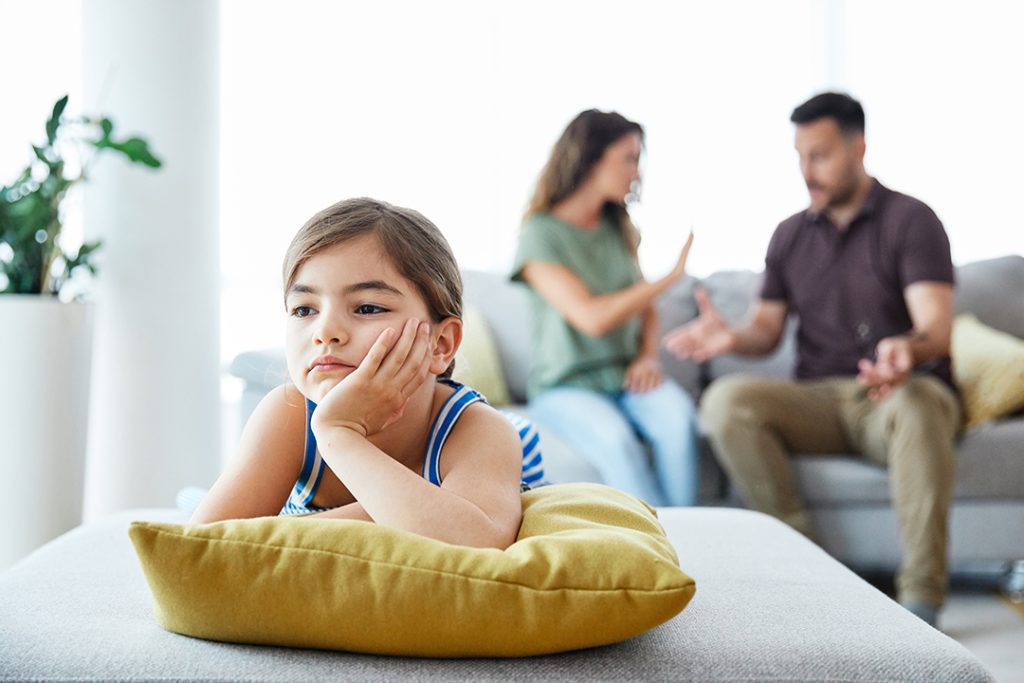Divorce may immerse children in a whirlpool of complex emotions. Triggering sensations of melancholy, vulnerability, and bewilderment as they adapt to the evolving dynamics within their family. Divorce vastly affect children emotionally and psychologically.

Table of Contents
Approximately 25% of children are under the age of 5, and 40% are between the ages of 6 and 11 in divorce. Studies have shown that they are at a higher risk for mental health issues, academic problems, and relationship difficulties later in life. Annually, over one million American children bear witness to their parents’ divorce as documented by the U.S. Census Bureau Statistical Abstract of the United States.
The American Psychological Association reports that approximately 40-50% of first marriages conclude in divorce. The divorce rate for second marriage is even more pronounced, standing at approximately 60-67% in the United States.
Children and Divorce
Divorce, a devastating term in itself, is intended for a married couple to part ways when they no longer wish to remain together. It has its advantages and drawbacks for the couple but alongside the challenges of divorce affect children.
According to the Census Bureau United States, the divorce rate has decreased over the past decade, yet it remains elevated. Divorce, under any circumstances, tears a child apart emotionally and psychologically, impeding the child’s wellbeing.
Children are the ones who endure the most from a broken parental bond. They are like a blank canvas, born without preconceived notions or information about the world. Hence, children are exceptionally vulnerable and can absorb positive or negative experiences that can affect them significantly.
Understanding How Divorce can Affect Children
As children are incapable of comprehending the ongoing situation, they are often forced to acquiesce or withdraw, significantly affecting their functioning. Children must navigate the dilemma of determining who is right and who is wrong.
Each parent may believe the other as being the wrong one and detrimental to them. It has a profound effect on a child’s mental self-image, subjecting them to an emotional roller-coaster.
Children experience difficulties in behavior. They may also grapple with psychological issues in the worst cases.
Behavioral Problems
Children while facing new challenges in life, went through behavioral problems. This might be their reaction to the emotional roller-coaster that they experience. Several problems arise when parents are overly involved in their matters. Leaving the child unattended and unsupported.
- Aggression/Irritability: Children experiencing their parents’ divorce might experience increased irritability and aggression. Such behaviors are often their adaptive strategies for the emotional challenges they are facing.
- Social Withdrawal: Divorce might lead children to be secluded from social engagements. It might happen because of their need to grasp the ongoing life transitions.
- Eating and Sleeping Patterns Change: Divorce is a hectic process that engages parents in their conflicts and routines might get disrupted. It causes changes in eating and sleeping patterns. Children find it difficult to understand the inattentiveness of parents and become upset. This leads them to unfavorable habits and health hazards.
- Risky Behaviors: Several children specifically teenagers find risky behaviors as a way to cope with the situation. It might include self-destructive actions. Parents must offer assistance and guidance for children and provide support and help if needed.
Mental Health Difficulties
Divorce can severely impact children psychologically. Children are vulnerable and lack comprehension. This psychological upheaval, causes sadness, worthlessness, and unresolved grief leading to severe mental health problems in children.
- Separation Anxiety: During the divorce process, children go through an apprehension of being distorted. It makes them anxious about separation from one or both parents, causing anxiety.
- Depression: Children when confronted with ignorance by parents, feel upset and abandoned. This might lead them to feel worthless and not needed. Parental sadness might also lead children to feel depressed at times.
- PTSD (Post Traumatic Stress Disorder): Divorce might make it a distressing ordeal by the way it is portrayed to children. The abrupt disclosure or separation might become a reason for stress following divorce leading to PTSD.
- Substance Abuse: There is a higher risk for children to turn to substance use as a result of stress and its coping. It might include their reliance on alcohol, narcotics, and over-the-counter drugs.
- Grief and Sense of Loss: Children might experience profound emotional distress and grief as their parents separate. It works as a way to cope with ongoing challenges in family structure. The sense of loss might disrupt the functioning of the child.
- Emotional Instability: The divorce process is hectic making the child experience emotional turbulence by parents. Children might develop an emotional instability by observing or experiencing it from parents.
Academic Challenges
While suffering through these challenges, children’s routines and performance are altered. It might cause academic challenges in the form of low grades, lack of focus, and elevated absence.
New Perceptions of Relationships
Children with divorced parents might develop an altered outlook on relationships. It can cause a sense of mistrust, communication breakdown, and uncertainty. Ultimately influencing the future interpersonal relationships of children as adults.
At What Age is a Child Most Affected by Divorce?

Children suffer differently as they age. Every child goes through different stages of development. Hence, they show unique reactions in each stage.
Effects of Divorce on Younger Child
A younger child will show befuddled and unsettled emotional conduct. They cannot comprehend what is going on and why they have to move between two homes.
Children show disruptive conduct such as overwhelming tears, lack of emotional bonds with non-custodian parents, solitude, and negative temperament most of the time.
A younger child is familiar with sensory and surrounding experiences. Divorce affect children when experiences several ongoing changes in the environment. This may also lead to atypical behavior.
Effects of Divorce on Grad Child
A school child will react separately to the situation. They may feel themselves as a cause which ultimately leads them to feel guilty, undesirable, and unworthy. They cannot understand the need for it.
The sudden change in family structure and dynamics left them hanging between several thoughts and assumptions. From this, self-condemnation is considered a reason most of the time by children of this age.
They develop unlikeness for themselves and indulge in self-harm behavior as a result of feelings of guilt and shame. They might also isolate and develop social unease in the longer run as a coping mechanism to deal with such situations. These children also suffer from adaptation challenges in school and neighborhood.
Effects of Divorce on Adolescence
The effect on adolescents includes an unacceptance of the whole scenario leading them to be irritated and show spontaneous actions. Children of this age consider one or both of their parents responsible. As a result, they prefer to have detached emotional connections or else they prefer to stay secluded.
Adolescents are vulnerable. They experience hormonal changes and alter emotional levels which may cause extreme behaviors. They do not accept living in an extended family, causing trouble with stepparents and stepsiblings leading to relationship conflicts.
Solitude, mistrust, and no attachment to anyone lead to several psychological challenges.
Adolescents might indulge in risky behaviors such as excessively risky games, self-harm behaviors, socially unacceptable behaviors, and breaking the law.
How Does Divorce Affect Children Later in Life?
The continuous emotional volatility, broken bonds, separation, and each new challenge post-divorce demands stability. All of these challenges leads to problems in developing new relationships.
The attachment apprehension and separation will always be there. It disturbs the normal pace of attachment and breakup. Such instability does not allow them to foster a happy healthy relationship or marriage.
Divorce affect children in an unconscious notion of not trusting their mate. They’ll fear emotional attachment, making or keeping relationships. Such isolation will increase the frustration and disruptive behavior.
The traumatic experiences might lead them to become anxiety-prone and make hasty assumptions. These children when grow older, prefer to behave in extremes. They will be irritated and bossy or isolated and upset most of the time.
What is the Hardest Part of Divorce for Children?

The hardest part in the process of divorce is legal guardianship. Common guardianship options include: allowing one or both parents to have rights over the child or they have to divide the time to stay with the child, despite giving custody, and the child will be gone into childcare or a new adoption.
Children might feel guilty in the post-divorce period especially if they frequently witness parental feuds. It appears as a confusing situation for the child.
Divorce affect children and parents with financial challenges, abandonment, and relocation. It is certainly a costly and emotionally peaceful end of their relationship. The diminished ability of one or both parents to constructively attend to children’s needs might cause distress. In most cases, parents remarry, which ultimately opens doors for new challenges and adjustment issues.
Most children of divorce want to maintain contact with both parents necessary for better adjustment. Unfortunately, this might be the last option parents will consider. Parents does not allow their children to be connected with the non-custodial parent. Custodian parents need to understand the needs of the children and maintain interlink.
How to Help Children Adjust to Divorce?

Adults who experience parental divorce have more interpersonal challenges. Studies have found that divorce rates are higher in people who experience parental divorce.
Parents who shout and scream in front of children must avoid it as it may cause mental anguish in them. They must avoid forcing children to pick sides. As it might lead to the development of emotional and psychological issues.
Parents must keep healthy and positive connections with children. Communication and warmth are the keys to making children adjust to divorce with less effect. A healthy parent-child relationship helps the children deal with this experience more productively.
Observe the children, and let your child be upset.answer the questions, and clarify every possible thing so the children do not linger on and assume. Do not hide or change any statement, talk to them and let them know everything. It will prepare them, and they’ll have less impact of abrupt parting.
Parents must teach children effective coping skills. It will increase their self-worth and reduce their anxiety about the future. Help children feel safe and protected. Any of these ways has a separate impact on children’s emotional, physical, psychological, and social health.
Hence, if the parents do not want their children to suffer, they have to be a cooperative co-parent.
Conclusion
No matter how bad the marriage was, how hard to keep up things with your ex, they’ll always be the other parent of your children. All these ways may help the children deal with the separation but consequently, children might feel several emotional and behavioral issues immediately after the divorce. However, if the issues persist, parents must seek expert assistance in terms of resolving the issues at the earliest possible time.